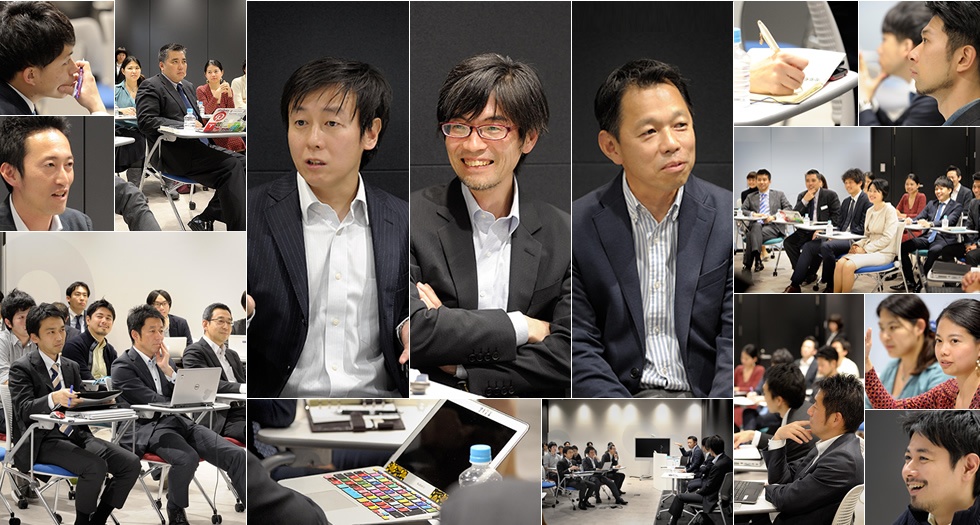If we want better, smarter, customer-driven companies, we must start by asking ourselves and one another these questions:
What motivates you to work?
What kind of place do you want to work at?
While money and benefits are important, studies show in the long run the work environment is more important in retaining and motivating people. If you cannot attract and keep your workforce then something must change if you expect your organization to survive.
Cybozu experienced this crossroad first hand. After going public in 2000, Cybozu became one of the fastest companies to IPO in Japanese history. Since then, Cybozu has maintained a steady hold in Japan as the No. 1 "groupware" provider and the IT leader with the No. 1 market share in the office software market beyond IBM and Microsoft.
But things were far from perfect. At that time, the company's turnover rate reached a staggering 28 percent. The cost of employees leaving the company and the cost of onboarding new employees weighed heavily on the minds of Cybozu's leadership. How do you find enough good people to meet the high growth demands of Cybozu while also maintaining a high employee satisfaction to keep them from leaving?
Osamu Yamada, now the CEO of Kintone Corporation in the United States, was the CFO for Cybozu in Japan. As the head of finance, Yamada was an unlikely candidate for the responsibility of revolutionizing Cybozu's HR policies, but he recognized an opportunity to transform the company by focusing on gender equality and employee satisfaction.
Work-life-balance was not a widely used phrase at that time, especially in Japan where traditional corporate culture maintains a strong preference for employees that work longer hours. Nevertheless, Yamada introduced company policies including generous allotments of remote work, highly flexible working hours, and a parental leave system that guarantees employees their jobs for up to six years.
In less than a year, Cybozu has noticed a sharp increase in employee motivation and productivity. Since then the company continues to push its progressive outlook, receiving recognition not only in Japan, but worldwide.
The story and thought on what lead up to this current moment is captured in the new book, “Only Thinking About the Team” by Cybozu CEO Yoshihisa Aono. In it features a treasure chest of ideas about how to build a company that everyone wants to work for.
The following interview between was part of the Japanese version of the HBR magazine DIAMOND. DHBR Chief Editor Fumio Iwasa facilitated the discussion between Aono and Yamada titled “Is Cybozu’s future, the future of Japanese companies?” (All photos courtesy of DHBR.)
CEO Aono has no interest in people?!
Iwasa: I started this discussion because I was so impressed by Mr.Aono’s book “Only Thinking About the Team.” Looking at what we have discussed so far, what do you think about it?
Aono (pictured below): It was very interesting. Cybozu’s HR system is still incomplete and there are areas I would like to extend. This discussion gave me new perspectives on these areas.
Yamada: Listening to everyone’s discussion on HR systems and companies, I learned that people think about 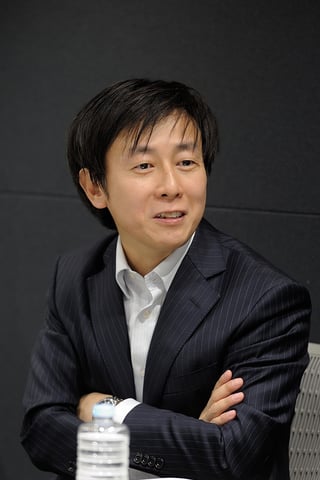 these topics on a regular basis. I joined Cybozu in 1992 from a bank, and have been involved in the HR and Legal Departments. It has been trial and error to find what works best. I would like to continue to try new and different things using Cybozu as the guinea pig or as “Japan’s HR Department.”
these topics on a regular basis. I joined Cybozu in 1992 from a bank, and have been involved in the HR and Legal Departments. It has been trial and error to find what works best. I would like to continue to try new and different things using Cybozu as the guinea pig or as “Japan’s HR Department.”
Iwasa: Mr. Aono, you wrote in your book “Yamada probably has no interest in the business” - is this true?
Yamada: It is. (laugh) People may think, “Even though you say that, you must have SOME interest,” but I don’t. Probably less than people may think. But I do agree with Cybozu’s value proposition - “to make better teams.”
Iwasa: On the other hand, from my point of view, Mr. Aono, you are a “software fanatic” nerd. Mr. Yamada was saying “Mr. Aono doesn’t like to communicate with others. That’s why he creates groupware.”
Aono: Wow, that is pretty accurate. If I had a three day weekend, I would stay home all three days. I would be perfectly fine not seeing anyone.
Iwasa: Wouldn’t someone like you, like teams and organizations?
Aono: I see organizations as physical phenomena’s. With software, you can enjoy the theory of “if you write this, it will move like this.” In the same way, I look for theories that move humans. Which rule moves people in a certain way? You test it out, and see if it does or doesn’t work.
Iwasa: There are different types of managers - those who are interested in people and those who aren’t. Mr. Aono, you would be the latter. You are not the type of person who would go to parties to make new friends.
Aono: You could say that. At dinner parties, I look for hiding places so that people won’t come up and talk to me. (laugh)
Iwasa: Then why is a person like you trying to spread teamwork to the world?
Aono: There’s a reason why I chose groupware. When internet was introduced to the world in 1994, I was astonished. I knew this would change the world. Mr. Fujita Susumu of CyberAgent thought it could be used for internet media. Mr. Hiroshi Mikitani of Rakuten thought it could be used to sell goods. I thought it could be used to “share information”.
When I was at Panasonic, I was the most junior so my job was to answer the phone. Calls would usually be for the manager, but he would often be out of the office, on business trips. It was really annoying because I’d have to explain the same thing multiple times during the day. If the information, that the manager was out of office, could be shared I wouldn’t have to repeat myself. The internet could enable this and I wanted to create it - that’s how I got started with groupware.
Even if we’re not winners in the market, we want to be winners in making the world a better place
Iwasa: What I sympathized the most in your book was “an HR system with 100 types of workstyles for 100 people,” the idea that every individual is unique. I love this theory, but on the other hand you have to “win” in the market. Can you win in the market and value individuals, both at the same time? Mr. Yamada?
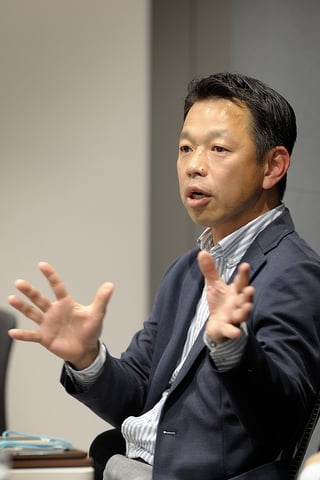 Yamada (pictured left): Honestly, I don’t know and it’s a challenge. I think the purpose of companies is to contribute to society and make the world a better place. For us, that means to create a society full of teamwork.
Yamada (pictured left): Honestly, I don’t know and it’s a challenge. I think the purpose of companies is to contribute to society and make the world a better place. For us, that means to create a society full of teamwork.
If you cut labor cost, your profit increases, and your investors are happy - but these investors will sell the shares. I’ve seen such reality and came to a conclusion on what we want to achieve. That is, to make investors, clients, and employees happy. This is our contribution to the society.
A company will never fail as long as we offer goods/services the people want and keep our employees happy. That’s why we don’t necessarily need to be the “winner,” even though we live in a world of money game. But if we fail, we won’t be able to continue the challenge, so we need to make sure not to “lose.” If there is a competition to make the world a better place, we want to win that game.
Iwasa: When you say “make the world a better place,” this includes making your employees happy. Mr. Aono?
Aono: Many companies with high employee satisfaction happen to be regional mid-sized companies. These are companies with strong support from the local community despite the slow or minimal growth in sales. I am not aiming to become such a company.
I am very competitive. I want to compete with Google and Microsoft in the global market. I would rather lose miserably in the US market against global companies, than end as a champion in Japan.
Yet we can’t recruit all the smart engineers from Stanford like Google and compete with them technically. So we look for other ways to beat them.
For example, an amazing company where employees work only three days a week and working mothers all work from home. Google won’t be able to compete with us in the same way. That’s what we’re trying to find.
Iwasa: Yet in IT industries, isn’t it important to recruit skilled engineers?
Aono: That is true. For example, we can’t compete in the search engine field. That is a field of mathematics and you would need many mathematicians.
On the other hand, groupware is different. We need to develop groupwares similar to how we create organizations, and master how to use it. Or else we won’t be able to offer it to our customers.
This is probably something mathematicians can’t do. We can compete in the global market because the teamwork we envision and the groupware goes hand in hand.
Iwasa: So groupware is something you can’t create just by recruiting smart people, but you need to reflect the “human side” of organizations.
Aono: I’ve been working with groupware for 19 years. Among our customers, there are those who has applied it very well and even improved their corporate culture. On the other hand, there are those who can’t even manage and share their schedules. It’s all about the function.
With groupware, you can’t make your customers happy unless you offer not only the product but also teach them how to use it. When you are determined to go that far, you can win in this market. Google probably won’t do this - it will be too much work.
Will Google conquer the world with groupware?
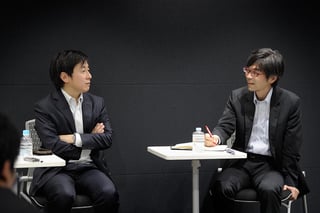
Iwasa: In a world of “de facto standard” and “winner takes all,” not the “best” product, but the “most used” product wins. If Google develops a groupware, can they conquer the world, even if it isn’t the greatest product?
Aono: That is possible, but there’s still room for competition. The key is “diversity.” Size, culture, industry -- companies are diverse. To satisfy all with one groupware is very challenging.
An individual owned product such as the iPhone, may boom and everyone might end up with owning one. After working with it for 19 years, I’ve learned that it isn’t the same with groupware.
If you stop thinking and to evolving with time, you can’t become a “de facto standard” in groupware. No matter how smart Google is, it will be difficult to dominate the market instantly.
Iwasa: In the software world, such as browsers and ERP, the trend is that ultimately one product dominates the market. Is the same possible with groupware?
Aono: Not impossible… we are trying to do that.
Iwasa: I think companies with such challenges emphasize decision making and growth speed. Yet Mr. Yamada says “Why do you expect growth and innovation from Cybozu?” Is this okay?
Yamada: When I joined Cybozu 15 years ago, “groupware” was an old term, but even today, it sells. What was then called “ASP” (application service provider) is now called “cloud” and users are increasing, but it is said that “cloud” hasn’t adapted to the Japanese market yet. That’s the speed we’re talking about.
The rise and fall of consumer targeted products is volatile, but the B2B products we work on capture the trend, therefore there is no merit in being ahead of the game. Such business characteristic probably matches well with how we create our organization.
Of course there will be times when we need to accelerate. We prepare for times like that by developing a strong base structure. We prefer creating an organization steadily and surely rather than focusing on growth and speed. We’re in no rush for product development either.
Aono: That’s correct. Adding new features, doesn’t necessarily mean it’ll be more convenient. We aim to be number one in the world, but not in sales and profit. We want to be the “most used” groupware manufacturer.
Iwasa: In that case, are you okay with distributing it for free?
Aono: Yes, even for free. As long as we can continuously offer the product. Wikipidea existing solely on donations is an ideal case.
In a way, that is a strategy. For those who want to increase sales and grow their business, groupware is not an attractive field. That’s why we have a chance in becoming the world’s best. We throw away sales and profit, and are okay that we’re in the red.
What would you do if you became no. 1 in the world?
Iwasa: There’s a 3D animation company named Polygon Pictures. They were a small production company with a grand goal of "one day becoming a company Pixar would use,”and they did become one. Now, Hollywood animated films won’t exist without this company. That’s how amazing this company is. 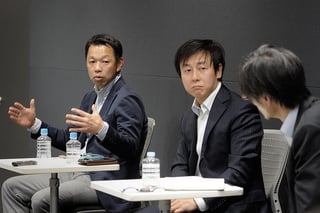
Animation production companies are known for their brutal working environment, but at Polygon, animators don’t pull all-nighters, not even over time. Their system is structured so that working mothers can continue to work. Production process is well managed so that they never miss a deadline.
Now that they are the world’s best, the company’s new problem is that they’ve lost their next goal. What would you do if Cybozu was in the same situation?
Aono: We would probably set the next goal. In the end of 2014, I was a little depressed for about a month, because our sales started to grow.
For about three years until then, we were desperate to launch the cloud business. Then finally sales started to take off, and I felt relieved but at the same time wondered if this was what I really wanted to do.
So I reflected back to Cybozu’s origin, and realized what we really need to do was change the world. Then we did more to do so, such as creating the workstyle movie and set a bigger goal. When I explained this, everyone agreed with me.
Who decided that companies must pursue profit?
Iwasa: Listening to both of you, you seem more like an NPO.
Yamada: In a way, we are probably like an NPO. Companies exist to contribute to the society, and in order to do so, they need to earn profit. With that profit, they create something better. Often college students ask, “what’s your CSR?” but we only do CSR!
Aono: The fundamental rule is that NPO’s don’t pursue profit and corporations do. But who decided this?
In my social studies text book in middle school, it said that corporations’ main goal is to pursue profit and I believed that. But once I started my own corporation, I wondered if that was necessary. Do we really need to pursue profit? That’s our new challenge and I would like to question the theory of capitalism.
Iwasa: You say these things even in front of investors.
Aono: Even in last week’s shareholders’ meeting, I clearly stated that “we won’t pursue sales and profit.” I think our investors are used to it by now. (laugh)
Iwasa: Were there unhappy investors in the beginning?
Yamada: In the beginning it was all about “beat Microsoft” and “x-% growth in sales in y-years” with specific dates in our plans.
We’d say “for investors’ profit” in shareholder’s meetings and set our KPI (Key Performance Indicator) on sales and profit.
Iwasa: At that time, your goal was in sales and profit but it probably means that you are in a different stage now. You can probably say so because you are now over the hump of life or death.
“Market Value” can’t make you happy
Aono: In 2005, we bought 9 companies and grew our sales by 4 times. Then I thought “What did I want to do?”. I bought these companies, but wasn’t interested in them at all, so management was a disaster. It was a time when I didn’t know what I was doing.
Yamada: There were many things we learned because we couldn’t manage these companies well. Our stock price rose with the acquisition, and our market value then was about 120 billion JPY- now it’s about 18 billion JPY. Even though our company was bigger, inside the company was chaotic and no one was happy. I mean, what were we doing.
Iwasa: So the company is in a better place now at 18 billion JPY than when it was at 120 billion JPY?
Aono: Absolutely. There’s more value when market value is at 18 billion JPY then at 120 billion JPY. If the stock price is that cheap, that means everyone can buy the stock. An employee said to me before, “Mr. Aono don’t say things that will increase the stock price. I’m desperately buying them." (laugh)
Iwasa: If the company’s goal is to contribute to the society, isn’t that too vague of a goal for employees to understand? When do you realize that your company is doing something good for the society?
Yamada: It’s satisfying when everyone says “Cyzbozu is a good company”, but it is difficult to say whether that means we are contributing to the society or not.
Aono: I have worked in large corporations before, but I never felt like I was leading the world. Now, our company is very small but attracts a lot of attention. That’s where I feel the future potential. I think we are actually leading the world and that’s where I feel the future of the company.
Cybozu is a small company but people from large corporations come to listen to our stories. Politicians are also interested in our company and we get invited to government run projects. I feel we are starting to move the world and that we are on the right track.
If we continue to pursue our ideal, this will eventually become the standard in the latter half of the 21st century.
Iwasa: But the society could be cold at times. One mistake and they will attack you.
Aono: That’s right. I will stay loyal to my family and stay out of trouble. (laugh)
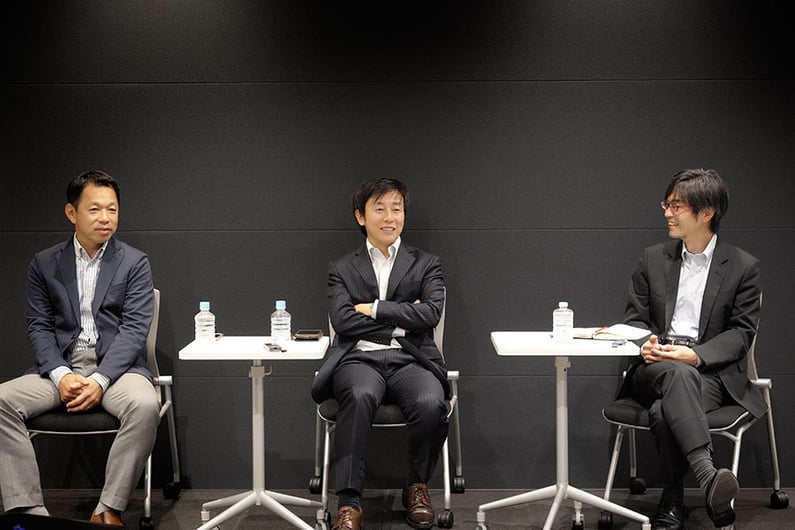
Don’t carve your ideas in stone.
Iwasa: In our discussion, the question “How does Mr.Aono think about his successors” came up. Until now, we have an image that Mr.Aono lead the company but what are your thoughts on the next generation? Are you preparing for when you’re gone?
Aono: Yamada and I decided “not to carve our ideas in stone”, or not to pass down our own ideas to the next generation.
“To spread teamwork in the world” -- that is Yamada’s and my ambition. I would feel uncomfortable forcing the next generation to take on this ambition. We don’t need successors. They can reset and think it over themselves.
Iwasa: But if the company breaks up, your users would be lost.
Yamada: The company may dissolve but if a different companies acquires the business, the service can continue. If Cybozu’s products and services are worth it, there will be companies willing to take over.
If what we are creating is worthless, it will dissolve. If not, it will live. Who will manage it, I think is a different question.
Iwasa: If the new CEO wants to sell the groupware business.
Yamada: That’s okay. As long as there are customers who use Cybozu’s groupware, there will be companies that will want to buy it. No need to focus on keeping the company.
Aono: Exactly.
Yamada: What’s so important about keeping the company? The company just happened to be a good structure to execute the service we wanted to provide. It doesn’t necessarily have to be a company.
Wikipedia isn’t a company and Linux is more like a community. The ways of thinking are changing but there are many people who are still desperate to keep the form of a company. This, I feel is strange.
Aono: I think you can question the idea of “an everlasting company is a good company.” A company is an intangible virtual being. People gathered and decided to call it Cybozu. To think it needs to live forever is not right.
What’s really important is whether those people who gathered are motivated or not. I think there’s something seriously wrong when I see people stressed out but are desperate to keep the company alive.
Iwasa: Thank you very much. This will be it for our discussion with you.
You may also be interested in:
About the Author
Nicole is Director of Marketing at Kintone, with 10+ years experience in content strategy, campaign management, lead acquisition and building positive work cultures of empowered, purpose-driven team members. She spent seven years as a journalist, previously serving as a CBS San Francisco digital producer, NPR contributor, Patagon Journal deputy editor and reporter for several publications, including the Chicago Tribune. She's passionate about the tech for good space, social entrepreneurship and women leadership. On the weekends, you’ll likely find her putting her Master Gardener skills to use in at community gardens in Oakland.



